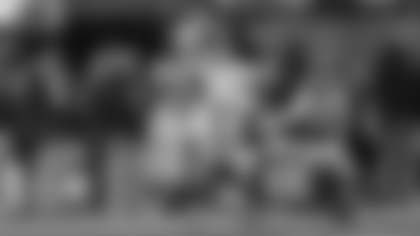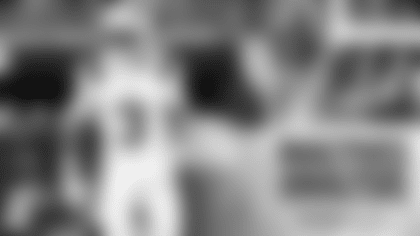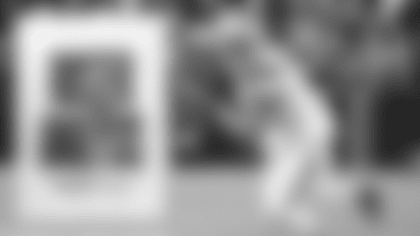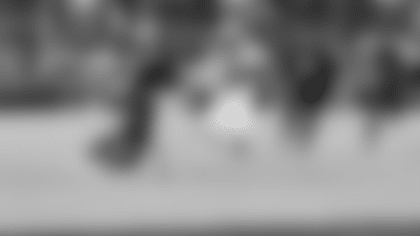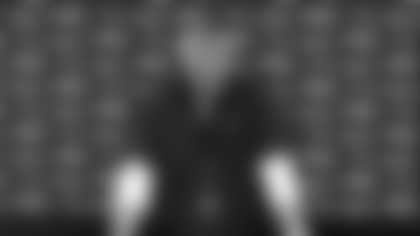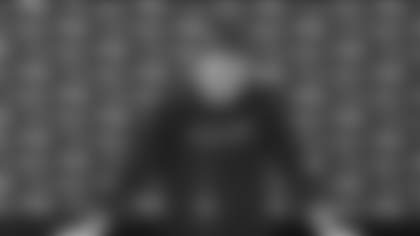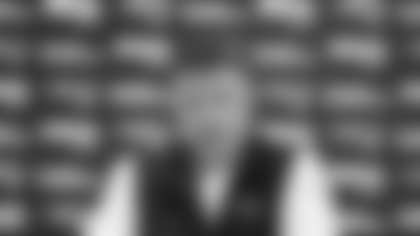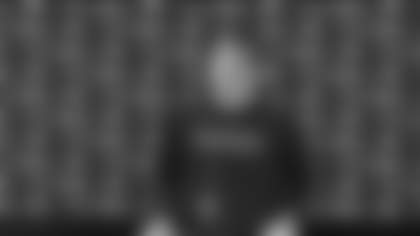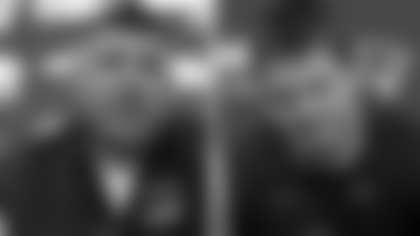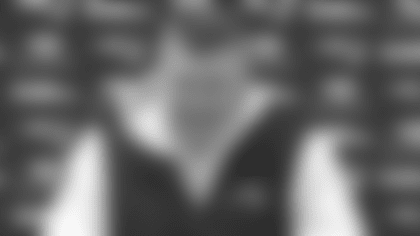[wysifield-embeddedaudio|eid="486741"|type="embeddedaudio"|view_mode="full"]
Q: What did you see from your red zone defense and your third-down defense especially early in the game?
BB: Well, you know, most all of those plays really revolve around team defense. Malcolm [Butler] made a good play on the interception and kind of used his body to box out [Antonio] Brown and make the play. But it's team defense. You've got to stop the run, you've got to make the quarterback uncomfortable, you've got to get on the receivers whether it's man or zone. We had our moments, but yeah, certainly in the end the red area was a huge difference in the game. In a close game those points amount to a lot. Again, team defense.
Q: Do you ever decide to sort of sacrifice the pass rush to ensure that the team defense is going to be solid against a particular weapon?
BB: Well, again, it comes back to team defense. We always try to do the best we can to defend whatever it is we're defending in that particular week or in that particular situation. How many guys you rush affects how many guys are in coverage and what coverage you can play to a certain degree. Some of that is a function of their personnel, their style of play, personnel and the situation. I think we used all - about everything along the way. But based on each game and each situation we try to do what we think is best. I mean we're not trying to sacrifice anything. We're just trying to win that down, win that situation.
Q: We know that certain positions have their own positional coach. Where do placekickers turn for that level of expertise? Do the special teams coaches have a level of knowledge about placekicking despite the fact they themselves may not have been kickers in the past?
BB: I certainly get where you're coming from. I don't think that's the case here. I can't speak for other teams. I think Joe [Judge] is very knowledgeable about the techniques of kicking. I know when I became a special teams coach and coached special teams for many years as an assistant coach and I continue to be involved with it as a head coach, but for many years as an assistant coach that's one of the things I had to learn. I had to learn how to coach those individual specialists; the snappers, the kickers, the punters, the returners. I don't think it's any different than coaching any other position. Things you don't know you need to learn and the things you do know you need to be able to teach to the players, however you've acquired that information. And some of that certainly comes from the players, especially when you coach good players at the position that you're coaching. You can learn a lot from them just like I learned a lot from many of the players that I coached going back to people like Dave Jennings as a punter or Carl Banks or Lawrence Taylor or Pepper [Johnson], guys like that as linebackers for the Giants. However you acquire that information you acquire it. You have to be able to convey it and teach it to the players and recognize technique or judgement. I mean look, there's a whole host of things that go into performance but all of the things that are related to those, but you know, be able to figure out which ones are the most important, which ones need to be corrected and so forth, but I think Joe is very knowledgeable in that, as was Scott O'Brien. I've had a lot of experience with that myself. But that's what coaching is. If you don't know it then you've got to find out. Nobody knows everything. I mean no coach knows everything about every position. Maybe if a guy has played it for a decade he might be well-versed in that position but I'd say for the most of the rest of us that haven't done that, things you don't know you've got to learn. You've got to find out. You've got to figure it out.
Q: What did you think of the performance of the offensive line yesterday?
BB: Well, again, I think the Steelers are a good defensive team and they give you some different looks. I thought we had our moments. There were times when we pass blocked well. There were times where we ran the ball well and had good blocking. We also had good running from LeGarrette [Blount] and we had some run-after-catch plays, like the screen pass by James [White] was a good run but also there were two very good blocks on that play from [Joe] Thuney and [David] Andrews. We had a couple of breakdowns in protection where we got called for a penalty or didn't have time to hold the ball. There were also times that we were able to extend the play. We made our share of plays. They made a few against us so I think there were a lot of good things there but not perfect; still things that we can work on and improve on like there are every week.
Q: In reference to the James White screen play that you mentioned, is it a little more difficult to call a screen play like that down in the red area due to the compacted space that you have to work with?
BB: I mean that's a good question, Phil [Perry]. I think it depends a little bit. But you know, for the most part on the screen once you get past the - maybe call it the first five to eight yards from the line of scrimmage to five-or-so yards down field - that's really where all the action takes place. You get the ball to the screen back and then you have one or two blockers, three blockers, whatever it is to block two or three guys whether it's a slip-screen to a wide-out or a back-screen. You've got a couple of blockers, you've got a couple of defenders and say whether the ball is on the 20-yard line, their 20 or your 20, it's probably going to be about the same space where those blocks occur. How much the deep guys get run off, I mean not as much obviously in the red area, but they're usually not the main factor on the play. The main factors on the play are the guys that are close to the line of scrimmage. Like the play that [Ryan] Shazier made, I think it was in the second quarter, we actually kind of had two blockers there. We couldn't quite get him. He made a nice play. He kind of knifed in between us and broke it up, but had we gotten him I think it would've been quite a few yards on that play. Again, it's usually really about getting the runner started and getting them I'd say, once you get them more than four or five yards down field then a lot of the rest of it takes care of itself. It's getting them to that point cleanly.
Q: Could there be any carry over for a kicker who is maybe practicing a different technique on kickoffs?
BB: I think they're definitely different. I don't think there's any question about that. It would be like a golfer. You've got to be able to hit a sand wedge, you've got to be able to hit a five iron, you've got to be able to drive, you've got to be able to putt. That's what kickers and punters do. There's plus-50 punts, there's field goals, there's kickoffs, there's back up punts, there's punts against a heavy rush, there's punts against a six-man box where both of the gunners are getting double teamed. And just like golf there are wind conditions and not wind conditions and so forth. It's not like they're standing out there on the driving range and banging the ball away every time. Especially on place kicks, you're dealing with a center and a holder and timing on the play so it's not like you're just placing the ball down there on a tee and kicking it like you are a golf ball or a kickoff. Yeah, they're definitely different. Whether it's a punter or kicker you're talking about, they have to master different skills, different kicks, different types of kicks, different things that are specific to their position just like every other player and every other athlete for the most part has to do. If you're a basketball player you can't just shoot free throws. You've got to be able to make some other shots, too. That's part of the position. Being able to do the things that are required of that position, and yeah, they're not all the same. But I don't think they're all the same for anybody.
Q: You were down a little bit depth wise with some of your big defensive tackles with Vincent Valentine and Woodrow Hamilton not active. How, if at all, did that affect the role of some of the other guys up front?
BB: Right. That was a little bit of a concern going into the game. I think Malcom [Brown] and Alan [Branch] did a good job, really did a good job on that. They've shown that they can play a lot of plays, the conditioning level is good. They can play a number of plays. But ideally that's not necessarily where you always want to be. In this game it probably helped us that we were ahead and it was really more of a passing game. I mean they threw 50 passes or whatever it was. But we played the run well anyway, in terms of average per carry and that type of thing. We did pretty well with the people we had in there; it just meant there was a little more duty for them. A.J. [Anthony Johnson] gave us some plays in there although his role is a little bit more in the passing game than the running game. That's one of those things you have to look at when you come up with the game day roster - who's available, how you think the game is going to go, what your needs are in the kicking game. You know, Geneo [Grissom] was active in the kicking game and really helped us, gave us a lot of good plays on special teams. But he's not a defensive tackle so there's that tug of war there, that give and take on the roster. We just felt like in the end we did what we felt was best for this game. If we played the game next week maybe we'd make a different decision. I don't know. But for where we were, given all the things that we felt we had to take into consideration, we did what we thought was best and it obviously put us a little thin at that position.
Q: On the Eric Rowe pass defense down the left sideline in the first quarter it looked like the key to that play for him drawing the offensive pass interference was getting his head up and trying to find the ball before he got to the receiver. What did you see on that play? What about the technique that might have helped him draw that important penalty?
BB: I talked to the official about that play and I talked to Eric [Rowe] about that play because that's something that we had talked a lot about during the week with our corners on deep balls. I mean we always talk about it but we specifically talked about those situations this week. So when that play came up it was right in front of our bench and I felt like I had a pretty good look at it. What the official told me was that the receiver grabbed [Eric] Rowe when he tried to look back for the ball and held him so he couldn't look which was kind of confirmed when I talked to Eric about the play as well. I couldn't see that. I was a little bit more behind the back of Eric, not as much in the front where evidently he was grabbed a little bit. You can kind of see it on film but it's a little tougher. The official had a much better view of it from the other side of the play and so that's what he called. I just wanted to make sure they we were playing the play properly and what the official told me was that we were and that he thought that the defender, that Rowe was trying to turn but that he was being grabbed by the receiver - by Hey-Bey [Darrius Heyward-Bey] on the turnaround and that's why he made the call. That was one that I'd say of all the other calls in the game, I don't think there was much conversation about any of those, but that particular one I actually did discuss with the officials there because it's a place right on our sideline. There was a timeout or something so I had a minute to talk about it.



